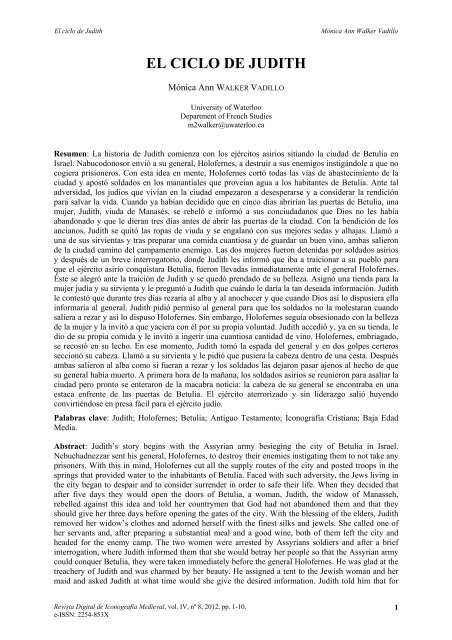Número 8 - Universidad Complutense - Universidad Complutense ...
Número 8 - Universidad Complutense - Universidad Complutense ...
Número 8 - Universidad Complutense - Universidad Complutense ...
You also want an ePaper? Increase the reach of your titles
YUMPU automatically turns print PDFs into web optimized ePapers that Google loves.
El ciclo de Judith Mónica Ann Walker Vadillo<br />
EL CICLO DE JUDITH<br />
Mónica Ann WALKER VADILLO<br />
University of Waterloo<br />
Department of French Studies<br />
m2walker@uwaterloo.ca<br />
Resumen: La historia de Judith comienza con los ejércitos asirios sitiando la ciudad de Betulia en<br />
Israel. Nabucodonosor envió a su general, Holofernes, a destruir a sus enemigos instigándole a que no<br />
cogiera prisioneros. Con esta idea en mente, Holofernes cortó todas las vías de abastecimiento de la<br />
ciudad y apostó soldados en los manantiales que proveían agua a los habitantes de Betulia. Ante tal<br />
adversidad, los judíos que vivían en la ciudad empezaron a desesperarse y a considerar la rendición<br />
para salvar la vida. Cuando ya habían decidido que en cinco días abrirían las puertas de Betulia, una<br />
mujer, Judith, viuda de Manasés, se rebeló e informó a sus conciudadanos que Dios no les había<br />
abandonado y que le dieran tres días antes de abrir las puertas de la ciudad. Con la bendición de los<br />
ancianos, Judith se quitó las ropas de viuda y se engalanó con sus mejores sedas y alhajas. Llamó a<br />
una de sus sirvientas y tras preparar una comida cuantiosa y de guardar un buen vino, ambas salieron<br />
de la ciudad camino del campamento enemigo. Las dos mujeres fueron detenidas por soldados asirios<br />
y después de un breve interrogatorio, donde Judith les informó que iba a traicionar a su pueblo para<br />
que el ejército asirio conquistara Betulia, fueron llevadas inmediatamente ante el general Holofernes.<br />
Éste se alegró ante la traición de Judith y se quedó prendado de su belleza. Asignó una tienda para la<br />
mujer judía y su sirvienta y le preguntó a Judith que cuándo le daría la tan deseada información. Judith<br />
le contestó que durante tres días rezaría al alba y al anochecer y que cuando Dios así lo dispusiera ella<br />
informaría al general. Judith pidió permiso al general para que los soldados no la molestaran cuando<br />
saliera a rezar y así lo dispuso Holofernes. Sin embargo, Holofernes seguía obsesionado con la belleza<br />
de la mujer y la invitó a que yaciera con él por su propia voluntad. Judith accedió y, ya en su tienda, le<br />
dio de su propia comida y le invitó a ingerir una cuantiosa cantidad de vino. Holofernes, embriagado,<br />
se recostó en su lecho. En ese momento, Judith tomó la espada del general y en dos golpes certeros<br />
seccionó su cabeza. Llamó a su sirvienta y le pidió que pusiera la cabeza dentro de una cesta. Después<br />
ambas salieron al alba como si fueran a rezar y los soldados las dejaron pasar ajenos al hecho de que<br />
su general había muerto. A primera hora de la mañana, los soldados asirios se reunieron para asaltar la<br />
ciudad pero pronto se enteraron de la macabra noticia: la cabeza de su general se encontraba en una<br />
estaca enfrente de las puertas de Betulia. El ejército aterrorizado y sin liderazgo salió huyendo<br />
convirtiéndose en presa fácil para el ejército judío.<br />
Palabras clave: Judith; Holofernes; Betulia; Antiguo Testamento; Iconografía Cristiana; Baja Edad<br />
Media.<br />
Abstract: Judith’s story begins with the Assyrian army besieging the city of Betulia in Israel.<br />
Nebuchadnezzar sent his general, Holofernes, to destroy their enemies instigating them to not take any<br />
prisoners. With this in mind, Holofernes cut all the supply routes of the city and posted troops in the<br />
springs that provided water to the inhabitants of Betulia. Faced with such adversity, the Jews living in<br />
the city began to despair and to consider surrender in order to safe their life. When they decided that<br />
after five days they would open the doors of Betulia, a woman, Judith, the widow of Manasseh,<br />
rebelled against this idea and told her countrymen that God had not abandoned them and that they<br />
should give her three days before opening the gates of the city. With the blessing of the elders, Judith<br />
removed her widow’s clothes and adorned herself with the finest silks and jewels. She called one of<br />
her servants and, after preparing a substantial meal and a good wine, both of them left the city and<br />
headed for the enemy camp. The two women were arrested by Assyrians soldiers and after a brief<br />
interrogation, where Judith informed them that she would betray her people so that the Assyrian army<br />
could conquer Betulia, they were taken immediately before the general Holofernes. He was glad at the<br />
treachery of Judith and was charmed by her beauty. He assigned a tent to the Jewish woman and her<br />
maid and asked Judith at what time would she give the desired information. Judith told him that for<br />
Revista Digital de Iconografía Medieval, vol. IV, nº 8, 2012, pp. 1-10.<br />
e-ISSN: 2254-853X<br />
1

















